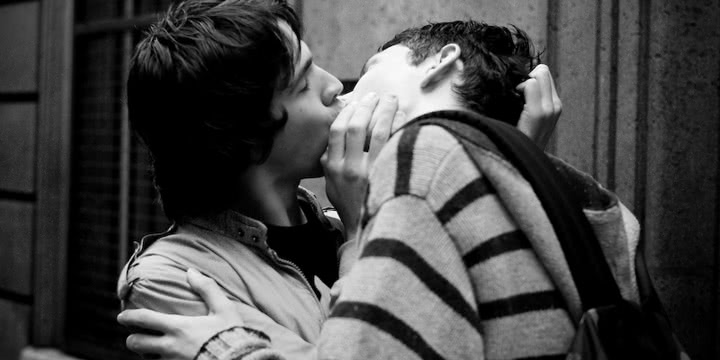Sydney’s Queer Screen Film Fest is on next week and I’ll be there with bells on.
We all crave media representation of ourselves. It’s why we get so invested in stories – because we can see ourselves in them. This is a bit trickier for the queers, considering mainstream representation of queer lives is still abysmal, full of a rampant reliance on stereotypes and tokenism.
A lot of the media I consumed when growing up was determined by what I like to call the Queer Quotient. The higher a piece of media scored on the Queer Quotient, the more likely I was to be interested in it. This ranged from things like movies that specifically catered to a queer audience, stuff like But I’m A Cheerleader, which would score highly on the Queer Quotient, to queer-baiting rubbish like Marissa’s lesbian romp with babin’ Alex on The O.C.
There was also the fact that queers were usually presented as freak-show entertainment or as a highly contrived, controversy-generating grabs at public eyeball real estate. It’s why so many television shows hinted at titillating lesbian romances yet produced no substance; it baited the queers while satisfying the bizarro voyeurism of the heteros on safari through a sanitised, filtered and ultimately safe gay world.
This made for some interesting messages for young queers. I mean on one hand, your sexuality exists as titillation, while on the other, it exists as some sort of horrendous sin that can only be represented in media by stripping it entirely of its core component – the actual sex.
The media’s “gay eunuch” has been around forever. That awful show, Queer Eye For The Straight Guy, was lauded as breakthrough entertainment, but it was an idiotic declaration made by hordes of clueless heteros who like their gays with a side of chastity. By contrast, shows like The L Word and Queer As Folk were absolutely, unapologetically full of sex. Gay sex. These shows ran concurrently with Queer Eye, yet they received limited accolades – they merely prompted the media to raise stupid moral questions while clapping Queer Eye on the back for doing such a great job at not alienating homophobes.
Basically, this amounts to, “It’s cool if you’re gay, just don’t be too gay. Also don’t have sex, because that’s gross. And gay.”
In fact, one of the story arcs in Queer As Folk centred around a gay eunuch, as Emmett (Peter Paige), scored a job on a news show as the “queer guy”. One of the other characters, Brian (Gale Harold) pointed out that Emmett’s segments made viewers feel better about themselves and their progressive views so long as he remained chaste and sexless. Outraged by this, Emmett decided to do a sexualised segment to prove Brian wrong and was consequently almost fired – proving the gay eunuch theory to be a painful truth.
There are a million ways to talk about the problematic nature of gay media representation, particularly given it is often at the mercy of hetero showrunners. It makes sense that the majority of media is hetero-centric simply because they are the majority. It doesn’t mean that it’s a free pass to treat queer stories as a quick ratings booster or controversy generator in their boring, bland and otherwise heteronormative narratives. We aren’t a fucking spice.
Queer-baiting is frustratingly effective though. The reason why is that for a long time, (and arguably, still today) the queer community has been absolutely starved for that sort of representation. It’s the whole reason why I started watching a show like The O.C. in the first place; suddenly there was a story in it I could relate to; suddenly I was seeing a version of myself (albeit horribly warped and exploitative) and I was excited to watch it. It was better than nothing.
I had a revelatory experience watching a gay romance for the first time. I’d always wondered if I was truly a cold-hearted cynic with no regard for romance… but it turns out that was only true for straight romances, and not because I’m an arsehole, but because I couldn’t relate to it. When I saw a gay romance on a crappy TV show, for the first time I thought, “Holy shit, this is how straight people must feel all the time!”
All that said, the media has made great, albeit slow, progress in terms of attempting to be balanced in its approach to different identities. We’ve got a way to go yet, but such is the nature of progression: it’s always in motion.
I suppose one can argue that the straight world is trying its hardest and you can’t please all of the people all of the time. To that I say, bless your heart but that’s malarkey. Of course you can’t please all of the people all of the time, but unless you want to actually try to do something with integrity, don’t treat queers as devices in your stories. Treat them as people.
[Kiss-In photo by William Hamon/Flickr]
This Week:
On Wednesday September 14, head over to SlyFox for All Out Fem Pop at Birdcage. Expect the usual dance floor bangers brought to you by Tanner Derrby, DJ Tiny, DJ Panz and other special guests and party treats. It’s gonna be a good ’un.
On Friday September 16, Giant Dwarf is hosting Queerstories. Join some of Sydney’s best storytellers for an evening of our city’s queerstories, reflections on lives well lived and battles fought. Speakers include the likes of Paul Mac, Amy Coopes, Kira Puru and Jonny Seymour.
Then, on Sunday September 18, head over to The Shift Club for Queen Cxnt, presented by Sydney Fringe Festival. The event has been described as “a powerful multi-sensory music theatre show exploring feminine sexuality in our psyche, language, planet and the cosmos.” Plus dancing, of course.


































